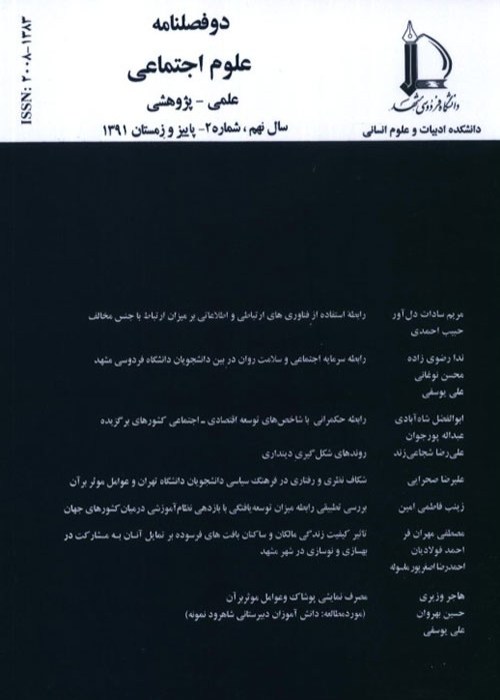The Relationship between Social Capital and Psychological Empowerment among the Female Household Heads Employed in Kosar Centers in Tehran Municipality
IntroductionThe poor women households are one of the most vulnerable groups in any society. Given the fact that in addition to the roles played by women in the family, they are responsible for the role of household care, the efforts to empower them have a special priority. In many theories about or studies on the empowerment of vulnerable groups, attention to psychological components of empowerment is visible. The main purpose of this research is to investigate the relationship between psychological empowerment and social capital. Accordingly, the main question of the research can be as follows: What is the relationship between psychological ability and its components with social capital and its components?
Theoretical FrameworkThis research has been linked to two main theoretical areas, including social capital theory and empowerment theory. The most important theoretical ideas about social capital can be seen in the work of Robert Putnam (1994), Francis Fukuyama (1995), James Colman and Peter Bourdieu (Tajbakhsh, 2005). A significant part of the psychological empowerment literature has grown in the field of organization theory. In this context, one of the prevailing views is Spreitzer's (1995) work. In this study, psychological empowerment has been redefined with a combination of indicators including mental health, self-esteem, self-confidence, responsibility, and motivation for progress. Regarding social capital and considering what has been suggested in various sources, including the World Bank (2011), the indicators are social participation, group membership, interpersonal trust, institutional trust, generalized trust, family and kinship relationships, neighborhood and friendship relationships, and finally lack of isolation.
MethodologyIn this study, a survey method has been used. In addition, in exploratory studies, documentary, observation, and interviewing techniques have been used. The statistical sample of this study was 324 female headed households working in skill and employment centers affiliated to the female empowerment staff of Tehran's municipality. The data gathering tool was a researcher-made questionnaire. To confirm the validity of the questionnaire, while using the authoritative books and resources in its design, the original design was reviewed based on the suggestions of a number of professors and experts. Also, Cronbach's alpha and inter-item correlation were used to control and confirm the reliability of the questionnaire. The results showed that the indicators were valid.
FindingsBased on the findings, there were significant correlations between the demographic characteristics of individuals and the main variables. The strongest correlation was observed between the income and the components of social capital. Education and age are in the next positions, respectively. The correlation between the age and components of social capital has generally been reversed. Also, significant differences in the means of the citizenship awareness, public awareness, feelings of exclusion and isolation, generalized trust, interpersonal trust, neighborhood relationships and family and kinship relationships were observed in single, married, widowed, and divorced groups. Regarding the assumptions about the relationship between social capital components and psychological empowerment components, the results showed that mental health, self-esteem, self-confidence, decision-making ability and responsibility have significantly correlated with all components of social capital. At the same time, motivation for progress has not had a meaningful relationship with neighborhood relationships and friendship relationships. But there are significant correlations between other components of social capital with this variable. Canonical correlation analysis has been used to investigate the general relationship between psychological empowerment and social capital. The findings of the canonical analysis show that the set of independent variables (i.e., social capital) has more power in explaining the variance of the dependent variables set (i.e., psychological empowerment) as compared to its opposite.
ConclusionThe purpose of this study was to investigate the relationship between social capital and its components, and psychological empowerment and its components. Canonical correlation analysis resulted in the extraction of three pairs of roots or canonical functions, which were statistically significant by putting the components of psychological empowerment in the dependent set and placing the components of social capital in the independent set. The correlation between the canonical variable corresponding to each set in the first, second, and third pairs were 0.630, 0.355, and 0.325, respectively. Considering the results of canonical correlation analysis, especially the study of the redundancy values, the main hypothesis of the research, (i.e., the impact of social capital on psychological empowerment) can be verified. These results were consistent with findings of other studies such as Keyvanara, Tavakoli, Samouei and Tavkoli (2012), Shoja, Nabavi, Kassani and Bagheri Yazdi (2012), Razavizadeh, Noghani and Yousefi (2012) and Welsh and Berry (2009).
- حق عضویت دریافتی صرف حمایت از نشریات عضو و نگهداری، تکمیل و توسعه مگیران میشود.
- پرداخت حق اشتراک و دانلود مقالات اجازه بازنشر آن در سایر رسانههای چاپی و دیجیتال را به کاربر نمیدهد.


